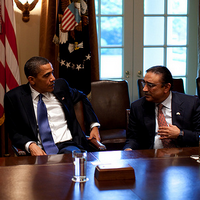The recent U.S. claims that Pakistan's intelligence service have aided attacks against U.S. troops in Afghanistan; the discovery that Osama bin Laden had been living for years in a safe house in central Pakistan; the U.S. special forces operation to attack his Pakistani compound without notifying Pakistani authorities; the disputes over U.S. drone strikes on Pakistani territory: These and other controversies are surface manifestations of a deeper "trust deficit" between the United States and Pakistan.
On Sept. 22, then-Chairman of the U.S. Joint Chiefs of Staff Adm. Mike Mullen made explosive comments about the nature of the relationship between Pakistan's Inter-Services Intelligence and the Haqqani terrorist network, whose members -- thought to number some 10,000 to 15,000 fighters -- operate in Afghanistan from bases in Pakistan. Although Mullen and other U.S. officials had previously denounced the ISI's continuing links to the group, in his testimony before Congress, Mullen explicitly claimed that the ISI had directed and supported Haqqani attacks on U.S. targets in Afghanistan in recent weeks.
The Haqqani network supports some of the most brutally effective insurgents in Afghanistan and has links with al-Qaida. Its main base of operations is located in North Waziristan on the Afghan-Pakistan border, an area that remains outside the control of the Pakistani military. Observers differ on whether the Pakistani armed forces have the capacity to suppress the network if they wanted to, with many suspecting that Pakistani commanders either support its activities or fear that attempting to suppress the group would lead it to strike back at Pakistani targets. For its part, the ISI acknowledges having supported the Haqqani and other terrorist groups during the 1990s, but claims to have severed all ties with them since the Sept. 11 terrorist attacks.

